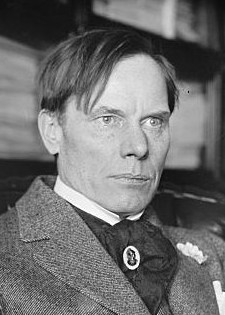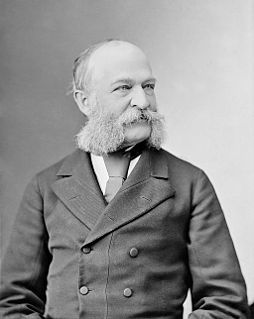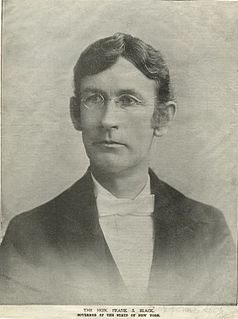
Irving Goodwin Vann (January 3, 1842 in Ulysses, Tompkins County, New York - March 22, 1921 in Syracuse, Onondaga County, New York) was an American lawyer, judge and politician from New York.

Irving Goodwin Vann (January 3, 1842 in Ulysses, Tompkins County, New York - March 22, 1921 in Syracuse, Onondaga County, New York) was an American lawyer, judge and politician from New York.

Irving Goodwin Vann was the only child of Samuel R. Vann and Catherine H. (Goodwin) Vann. Vann received no formal education until he attended the Trumansburg Academy and then Ithaca Academy, in preparation for college. He enrolled at Yale College in 1859 and graduated B.A. in 1863. Vann initially pursued a career in education, becoming a high school principal and teacher in Owensboro, Kentucky; however, he resigned after a year to pursue a career in law instead. He began to study law at the office of Boardman & Finch in Ithaca, New York, and then entered Albany Law School in the fall of 1864, graduating in the spring of 1865. Upon graduation from Albany Law School, Vann worked briefly for the Department of Treasury in Washington, D.C., but within a year he returned home to central New York and joined the law firm of Raynor and Butler in Syracuse.
Vann married Julie Florence Dillaye (1846-1934), the daughter of a Syracuse real estate developer, on October 11, 1870. They had two children, Florence (1871-1942) and Irving Dillaye (1875-1944).
He was Mayor of Syracuse, New York from 1879 to 1880. He was a justice of the New York Supreme Court (5th District) from 1882 to 1895.
On December 31, 1895, he was appointed by Governor Levi P. Morton to the New York Court of Appeals to fill the vacancy caused by the resignation of Rufus W. Peckham, Jr, who had been appointed to the U.S. Supreme Court. In 1896, he was elected on the Republican ticket to a full term on the Court of Appeals, was re-elected in 1910, and remained on the bench until the end of 1912 when he reached the constitutional age limit of 70 years.
In 1913, he was one of the lawyers representing William Sulzer at his impeachment trial, and the only one who refused to receive monetary compensation from the State, noting that no further payment was necessary since he was already an employee of the state. (After his retirement as a judge, he had been appointed an official referee to hear claims arising out of the construction of the barge canal). [1]
Vann was buried at the Oakwood Cemetery.
His son Irving Dillaye Vann (1876–1944) was a Deputy New York Attorney General.

The Appellate Divisions of the Supreme Court of the State of New York are the intermediate appellate courts in New York State. There are four Appellate Divisions, one in each of the state's four Judicial Departments.

William Sulzer was an American lawyer and politician, nicknamed Plain Bill Sulzer. He was the 39th Governor of New York and a long-serving congressman from the same state. He was the first and so far only New York governor to be impeached. He broke with his sponsors at Tammany Hall, and they produced convincing evidence that Sulzer had falsified his sworn statement of campaign expenditures.

Rufus W. Peckham was an Associate Justice of the Supreme Court of the United States from 1895 until 1909. He was known for his strong use of substantive due process to invalidate regulations of business and property. Peckham's namesake father was also a lawyer and judge, and a representative. His older brother, Wheeler Hazard Peckham (1833–1905), was one of the lawyers who prosecuted Boss Tweed and a failed nominee to the Supreme Court. His other brother, Joseph Henry, died at 17.

Greene Carrier Bronson was an American lawyer and politician from New York.

Frank Harris Hiscock was an American lawyer and politician from New York. He was Chief Judge of the New York Court of Appeals from 1917 to 1926.

The 1914 New York state election was held on November 3, 1914, to elect the governor, the lieutenant governor, the secretary state, the state comptroller, the attorney general, the state treasurer, the state engineer, a U.S. Senator and a judge of the New York Court of Appeals, as well as all members of the New York State Assembly and the New York State Senate, and delegates-at-large to the New York State Constitutional Convention of 1915.

The 1912 New York state election was held on November 5, 1912, to elect the governor, the lieutenant governor, the secretary state, the state comptroller, the attorney general, the state treasurer, the state engineer and two judges of the New York Court of Appeals, as well as all members of the New York State Assembly and the New York State Senate. The voters were also asked if they approved a $50,000,000 bond issue for "good roads construction," which was answered in the affirmative, with 657,548 For and 281,265 Against.

The 1894 New York state election was held on November 6, 1894, to elect the governor, the lieutenant governor and a judge of the New York Court of Appeals, as well as all members of the New York State Assembly. Besides, a new State Constitution and four other constitutional amendments were proposed to the electorate, and were all accepted. Furthermore, the inhabitants of New York County and adjacent communities were asked if they wanted to join the proposed enlarged New York City, a project known as The Consolidation.

The 1896 New York state election was held on November 3, 1896, to elect the Governor, the Lieutenant Governor and a judge of the New York Court of Appeals, as well as all members of the New York State Assembly. Besides, a constitutional amendment on forestry was proposed, and rejected with 321,486 votes for and 710,505 against it.

John Thomas McDonough was an American lawyer and politician.

Simon Wolfe Rosendale was an American lawyer and politician. Rosendale was the first Jew elected to a statewide elective office in New York.

Cuthbert Winfred Pound was an American lawyer and politician from New York. He was Chief Judge of the New York Court of Appeals from 1932 to 1934.

The 1892 New York state election was held on November 8, 1892, to elect the Chief Judge of the New York Court of Appeals, as well as all members of the New York State Assembly. Besides, three amendments to the State Constitution were proposed: to transfer the settlement of contested elections to the courts, to authorize the sale of the state-owned salt works at Salina, New York, and to increase the number of New York Supreme Court justices by ten.

The 1893 New York state election was held on November 7, 1893, to elect the Secretary of State, the State Comptroller, the Attorney General, the State Treasurer, the State Engineer and a judge of the New York Court of Appeals, as well as all members of the New York State Assembly and the New York State Senate, and delegates to the New York State Constitutional Convention of 1894.

The 1895 New York state election was held on November 5, 1895, to elect the Secretary of State, the State Comptroller, the Attorney General, the State Treasurer, the State Engineer and a judge of the New York Court of Appeals, as well as all members of the New York State Assembly and the New York State Senate. Besides, the voters were asked if they approved of the State's issuing bonds for $9,000,000.00 to spend on canal improvements, which the electorate answered in the affirmative.
Leonard Callender Crouch was an American lawyer and politician.
Charles Brown Sears was an American lawyer and politician from New York.

George Gardner Barnard was an American lawyer and politician from New York. He was one of only four people ever tried by the New York Court for the Trial of Impeachments.

Robert Cyrus Titus was an American lawyer and politician from New York.